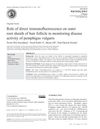April 2017 in “The journal of investigative dermatology/Journal of investigative dermatology” Researchers found that certain miRNAs, which affect immune system regulation, are differently expressed in mice with a hair loss condition compared to healthy mice.
 May 2024 in “European Journal of Immunology”
May 2024 in “European Journal of Immunology” Vitamin B5 and coenzyme A may help regulate the immune system and could improve treatments for chronic diseases and cancer.
 610 citations,
April 2014 in “Nature Reviews Immunology”
610 citations,
April 2014 in “Nature Reviews Immunology” The document concludes that understanding how the skin's immune system and inflammation work is complex and requires more research to improve treatments for skin diseases.
 82 citations,
October 2019 in “Frontiers in Immunology”
82 citations,
October 2019 in “Frontiers in Immunology” Changes to the Foxp3 protein affect how well regulatory T cells can control the immune system, which could help treat immune diseases and cancer.
 119 citations,
January 2012 in “Nutrition & Metabolism”
119 citations,
January 2012 in “Nutrition & Metabolism” Modern lifestyles, including poor diet, stress, and long-term use of certain medications, hinder the body's ability to heal from inflammation, leading to chronic diseases.
110 citations,
December 2013 in “The journal of investigative dermatology. Symposium proceedings/The Journal of investigative dermatology symposium proceedings” Alopecia areata is a genetic and immune-related hair loss condition that is often associated with other autoimmune diseases and does not typically cause permanent damage to hair follicles.
 25 citations,
March 2012 in “Journal of Dermatological Science”
25 citations,
March 2012 in “Journal of Dermatological Science” Genetic variants linked to ten skin diseases were found, showing both immune and non-immune factors play a role.
 9 citations,
April 2023 in “Frontiers in immunology”
9 citations,
April 2023 in “Frontiers in immunology” New technologies help us better understand how skin microbes affect skin diseases.
 7 citations,
December 2004 in “Medicine”
7 citations,
December 2004 in “Medicine” Knowing how skin works and its diseases helps doctors diagnose and treat skin conditions better.
5 citations,
August 1981 in “Archives of Dermatology” Alopecia areata may be caused by the immune system attacking hair follicles.
 July 2023 in “Chinese Journal of Dermatology”
July 2023 in “Chinese Journal of Dermatology” COVID-19 may cause common hair loss due to stress, immune response, medications, and other health issues.
 January 2025 in “ACS Applied Materials & Interfaces”
January 2025 in “ACS Applied Materials & Interfaces” Nanoparticles with specific drugs can help regrow hair in alopecia areata.
41 citations,
May 2020 in “Frontiers in immunology” Hidradenitis suppurativa might be a type of autoinflammatory skin disease.
 May 2022 in “Benha Journal of Applied Sciences”
May 2022 in “Benha Journal of Applied Sciences” Higher levels of PD-L1 are linked to more severe hair loss in people with Alopecia Areata.
 47 citations,
March 2022 in “Frontiers in cellular and infection microbiology”
47 citations,
March 2022 in “Frontiers in cellular and infection microbiology” Changes in skin microbes play a role in some skin diseases and could lead to new treatments.
 1 citations,
September 2017 in “Journal of Pathology of Nepal”
1 citations,
September 2017 in “Journal of Pathology of Nepal” Testing hair roots with a special dye is a simple, non-invasive way to check disease progress in pemphigus vulgaris patients.
 20 citations,
June 2010 in “Genes and Immunity”
20 citations,
June 2010 in “Genes and Immunity” Blood tests can help understand the genetic differences in people with alopecia areata, including how severe it is and if it's inherited.
 34 citations,
July 2020 in “Frontiers in immunology”
34 citations,
July 2020 in “Frontiers in immunology” Androgens may influence T cells, contributing to higher autoimmune liver disease risk in women.
 11 citations,
January 2022 in “Journal der Deutschen Dermatologischen Gesellschaft”
11 citations,
January 2022 in “Journal der Deutschen Dermatologischen Gesellschaft” Alopecia areata is a chronic condition causing hair loss, with new treatments targeting the immune system showing promise.
69 citations,
July 2002 in “Clinical and Experimental Dermatology” Alopecia areata is influenced by genetics and immune system factors, and better understanding could improve treatments.
 252 citations,
April 2009 in “Seminars in Cell & Developmental Biology”
252 citations,
April 2009 in “Seminars in Cell & Developmental Biology” The immune system plays a key role in tissue repair, affecting both healing quality and regenerative ability.
 125 citations,
August 2020 in “Frontiers in Immunology”
125 citations,
August 2020 in “Frontiers in Immunology” Men generally have more severe COVID-19 cases and higher death rates than women due to biological differences.
 1 citations,
March 2023 in “International journal of rheumatic diseases”
1 citations,
March 2023 in “International journal of rheumatic diseases” Relatives of lupus patients show signs of immune system activity but not full-blown lupus.
 July 2018 in “British Journal of Dermatology”
July 2018 in “British Journal of Dermatology” Hair regrowth was seen in 83% of children with alopecia, immune system plays a role in the condition, and various treatments showed effectiveness for hair and nail disorders.
 15 citations,
July 1999 in “Dermatologic Clinics”
15 citations,
July 1999 in “Dermatologic Clinics” The document concludes that immune system abnormalities cause alopecia areata, but the exact process is still not completely understood.
April 2024 in “International journal of molecular sciences” Alopecia areata and vitiligo share immune system dysfunction but differ in specific immune responses and affected areas.
 November 2003 in “Journal of Investigative Dermatology”
November 2003 in “Journal of Investigative Dermatology” Topical Imiquimod may fight vascular tumors by affecting blood vessels or the immune system, low iron might be linked to some hair loss, removing the top skin layer helps vitamin C get in, genetic testing helps diagnose skin conditions, and too much iron could worsen skin inflammation.
27 citations,
April 2012 in “Pediatrics in review” Common skin fungal infections can suggest a weak immune system, and for scalp infections, pills work better than creams, with several drug options available.
7 citations,
November 2018 in “British Journal of Dermatology” Alopecia areata is caused by immune system issues, and JAK inhibitors might help treat it.
34 citations,
June 2020 in “British journal of dermatology/British journal of dermatology, Supplement” Frontal fibrosing alopecia is linked to increased immune system activity and reduced stem cells, suggesting early treatment targeting this pathway might prevent hair follicle damage.




















